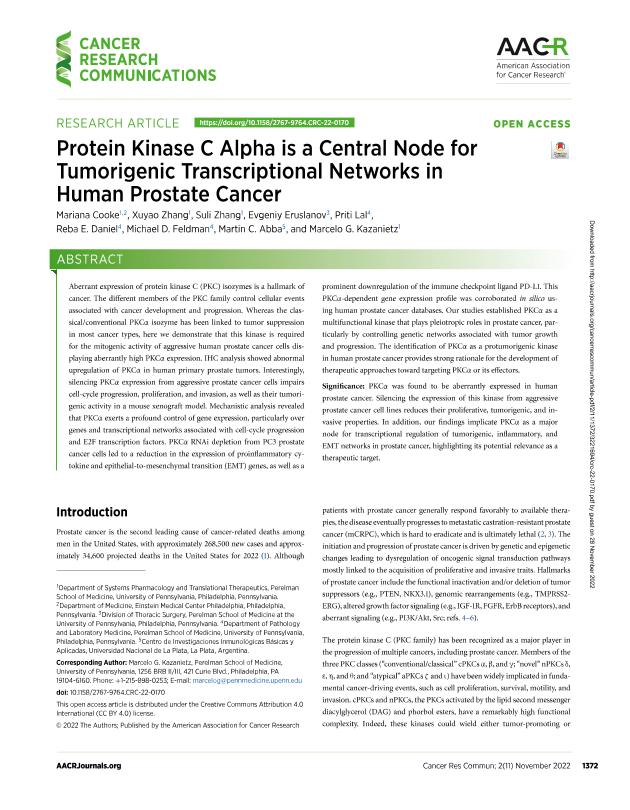Mostrar el registro sencillo del ítem
dc.contributor.author
Cooke, Mariana

dc.contributor.author
Zhang, Xuyao
dc.contributor.author
Zhang, Suli
dc.contributor.author
Eruslanov, Evgeniy
dc.contributor.author
Lal, Priti
dc.contributor.author
Daniel, Reba E.
dc.contributor.author
Feldman, Michael D.
dc.contributor.author
Abba, Martín Carlos

dc.contributor.author
Kazanietz, Marcelo Gabriel

dc.date.available
2023-11-22T11:19:00Z
dc.date.issued
2022-11
dc.identifier.citation
Cooke, Mariana; Zhang, Xuyao; Zhang, Suli; Eruslanov, Evgeniy; Lal, Priti; et al.; Protein kinase C alpha is a central node for tumorigenic transcriptional networks in human prostate cancer; American Association for Cancer Research; Cancer Research Communications; 2; 11; 11-2022; 1372-1387
dc.identifier.uri
http://hdl.handle.net/11336/218466
dc.description.abstract
Aberrant expression of protein kinase C (PKC) isozymes is a hallmark of cancer. The different members of the PKC family control cellular events associated with cancer development and progression. Whereas the classical/conventional PKCα isozyme has been linked to tumor suppression in most cancer types, here we demonstrate that this kinase is required for the mitogenic activity of aggressive human prostate cancer cells displaying aberrantly high PKCα expression. IHC analysis showed abnormal upregulation of PKCα in human primary prostate tumors. Interestingly, silencing PKCα expression from aggressive prostate cancer cells impairs cell-cycle progression, proliferation, and invasion, as well as their tumorigenic activity in a mouse xenograft model. Mechanistic analysis revealed that PKCα exerts a profound control of gene expression, particularly over genes and transcriptional networks associated with cell-cycle progression and E2F transcription factors. PKCα RNAi depletion from PC3 prostate cancer cells led to a reduction in the expression of proinflammatory cytokine and epithelial-to-mesenchymal transition (EMT) genes, as well as a prominent downregulation of the immune checkpoint ligand PD-L1. This PKCα-dependent gene expression profile was corroborated in silico using human prostate cancer databases. Our studies established PKCα as a multifunctional kinase that plays pleiotropic roles in prostate cancer, particularly by controlling genetic networks associated with tumor growth and progression. The identification of PKCα as a protumorigenic kinase in human prostate cancer provides strong rationale for the development of therapeutic approaches toward targeting PKCα or its effectors. Significance: PKCα was found to be aberrantly expressed in human prostate cancer. Silencing the expression of this kinase from aggressive prostate cancer cell lines reduces their proliferative, tumorigenic, and invasive properties. In addition, our findings implicate PKCα as a major node for transcriptional regulation of tumorigenic, inflammatory, and EMT networks in prostate cancer, highlighting its potential relevance as a therapeutic target.
dc.format
application/pdf
dc.language.iso
eng
dc.publisher
American Association for Cancer Research

dc.rights
info:eu-repo/semantics/openAccess
dc.rights.uri
https://creativecommons.org/licenses/by/2.5/ar/
dc.subject
PROSTATE
dc.subject
CANCER
dc.subject
PRKCA
dc.subject
TUMORIGENIC
dc.subject.classification
Bioquímica y Biología Molecular

dc.subject.classification
Ciencias Biológicas

dc.subject.classification
CIENCIAS NATURALES Y EXACTAS

dc.title
Protein kinase C alpha is a central node for tumorigenic transcriptional networks in human prostate cancer
dc.type
info:eu-repo/semantics/article
dc.type
info:ar-repo/semantics/artículo
dc.type
info:eu-repo/semantics/publishedVersion
dc.date.updated
2023-11-15T16:02:18Z
dc.identifier.eissn
2767-9764
dc.journal.volume
2
dc.journal.number
11
dc.journal.pagination
1372-1387
dc.journal.pais
Estados Unidos

dc.journal.ciudad
Philadelphia
dc.description.fil
Fil: Cooke, Mariana. Consejo Nacional de Investigaciones Científicas y Técnicas. Oficina de Coordinación Administrativa Houssay. Instituto de Investigaciones Biomédicas. Universidad de Buenos Aires. Facultad de Medicina. Instituto de Investigaciones Biomédicas; Argentina. University of Pennsylvania; Estados Unidos
dc.description.fil
Fil: Zhang, Xuyao. University of Pennsylvania; Estados Unidos
dc.description.fil
Fil: Zhang, Suli. University of Pennsylvania; Estados Unidos
dc.description.fil
Fil: Eruslanov, Evgeniy. University of Pennsylvania; Estados Unidos
dc.description.fil
Fil: Lal, Priti. University of Pennsylvania; Estados Unidos
dc.description.fil
Fil: Daniel, Reba E.. University of Pennsylvania; Estados Unidos
dc.description.fil
Fil: Feldman, Michael D.. University of Pennsylvania; Estados Unidos
dc.description.fil
Fil: Abba, Martín Carlos. Universidad Nacional de La Plata. Facultad de Ciencias Médicas. Centro de Investigaciones Inmunológicas Básicas y Aplicadas; Argentina. Consejo Nacional de Investigaciones Científicas y Técnicas. Centro Científico Tecnológico Conicet - La Plata; Argentina
dc.description.fil
Fil: Kazanietz, Marcelo Gabriel. University of Pennsylvania; Estados Unidos
dc.journal.title
Cancer Research Communications
dc.relation.alternativeid
info:eu-repo/semantics/altIdentifier/url/https://aacrjournals.org/cancerrescommun/article/2/11/1372/710508/Protein-Kinase-C-Alpha-is-a-Central-Node-for
dc.relation.alternativeid
info:eu-repo/semantics/altIdentifier/doi/https://doi.org/10.1158/2767-9764.CRC-22-0170
Archivos asociados
